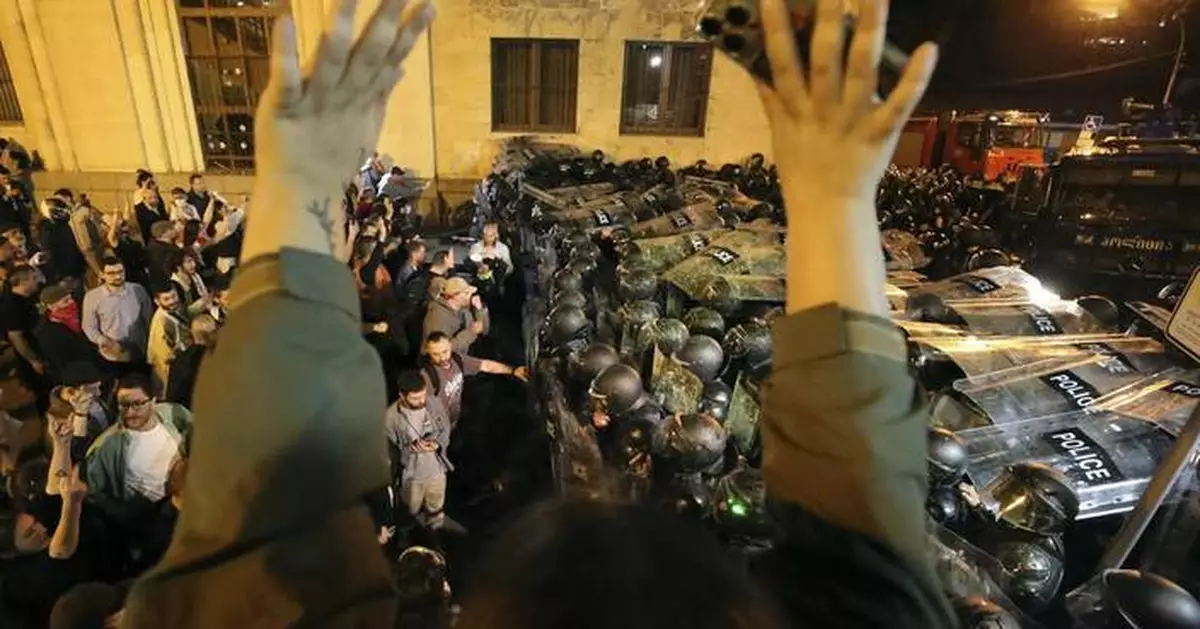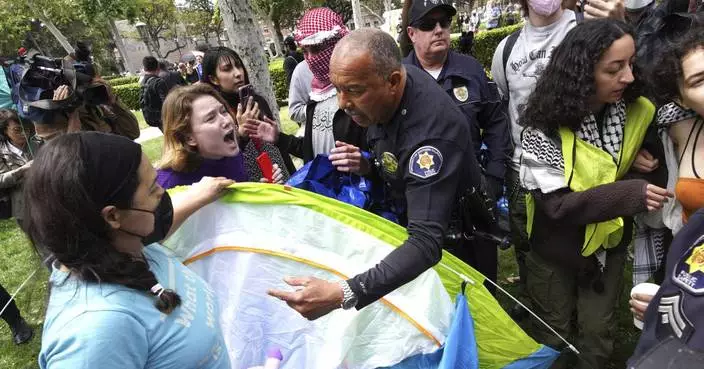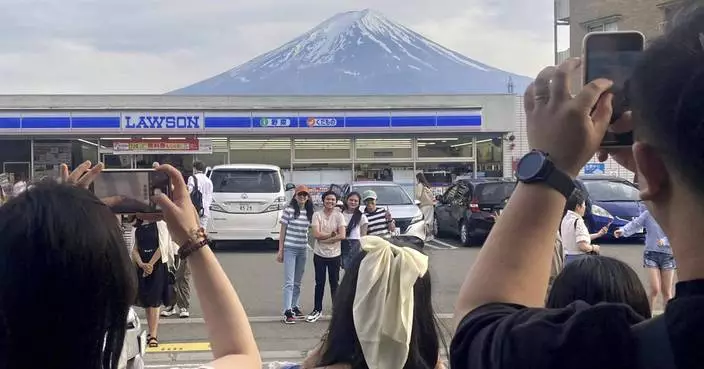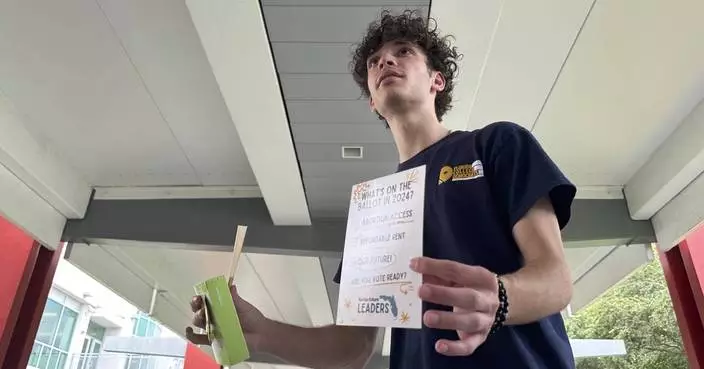TBILISI, Georgia (AP) — Georgia's parliament has voted in the first reading to approve a proposed law that would require media and non-commercial organizations to register as being under foreign influence if they receive more than 20% of their funding from abroad.
Thousands gathered outside parliament to protest. Opponents say the proposal would obstruct Georgia’s long-sought prospects of joining the European Union. They denounce it as “the Russian law” because Moscow uses similar legislation to stigmatize independent news media and organizations seen as being at odds with the Kremlin.
Click to Gallery
TBILISI, Georgia (AP) — Georgia's parliament has voted in the first reading to approve a proposed law that would require media and non-commercial organizations to register as being under foreign influence if they receive more than 20% of their funding from abroad.
A demonstrator waves Georgian national flags during a rally outside the parliament building in Tbilisi, Georgia, on Thursday, April 18, 2024, to protest against "the Russian law" similar to a law that Russia uses to stigmatize independent news media and organizations seen as being at odds with the Kremlin. (AP Photo/Zurab Tsertsvadze)
A demonstrator shouts during a rally outside the parliament building in Tbilisi, Georgia, on Thursday, April 18, 2024, to protest against "the Russian law" similar to a law that Russia uses to stigmatize independent news media and organizations seen as being at odds with the Kremlin. (AP Photo/Zurab Tsertsvadze)
A demonstrator holds a EU flag as other gather outside the parliament building in Tbilisi, Georgia, on Wednesday, April 17, 2024, to protest against "the Russian law" similar to a law that Russia uses to stigmatize independent news media and organizations seen as being at odds with the Kremlin. (AP Photo/Zurab Tsertsvadze)
Demonstrators wave Georgian and EU flags as they gather outside the parliament building in Tbilisi, Georgia, on Wednesday, April 17, 2024, to protest against "the Russian law" similar to a law that Russia uses to stigmatize independent news media and organizations seen as being at odds with the Kremlin. (AP Photo/Zurab Tsertsvadze)
Demonstrators wave Georgian and EU flags as they gather outside the parliament building in Tbilisi, Georgia, on Wednesday, April 17, 2024, to protest against "the Russian law" similar to a law that Russia uses to stigmatize independent news media and organizations seen as being at odds with the Kremlin. (AP Photo/Zurab Tsertsvadze)
Demonstrators gather outside the parliament building in Tbilisi, Georgia, on Wednesday, April 17, 2024, to protest against "the Russian law" similar to a law that Russia uses to stigmatize independent news media and organizations seen as being at odds with the Kremlin. (AP Photo/Zurab Tsertsvadze)
Police try to block demonstrators gathered outside the parliament building in Tbilisi, Georgia, on Thursday, April 18, 2024, to protest against "the Russian law" similar to a law that Russia uses to stigmatize independent news media and organizations seen as being at odds with the Kremlin. (AP Photo/Zurab Tsertsvadze)
Demonstrator shouts during a rally outside the parliament building in Tbilisi, Georgia, on Thursday, April 18, 2024, to protest against "the Russian law" similar to a law that Russia uses to stigmatize independent news media and organizations seen as being at odds with the Kremlin. (AP Photo/Zurab Tsertsvadze)
A demonstrator gestures as he shouts during a rally outside the parliament building in Tbilisi, Georgia, on Thursday, April 18, 2024, to protest against "the Russian law" similar to a law that Russia uses to stigmatize independent news media and organizations seen as being at odds with the Kremlin. (AP Photo/Zurab Tsertsvadze)
A demonstrator holds a Georgian national flag during a rally outside the parliament building in Tbilisi, Georgia, on Wednesday, April 17, 2024, to protest against "the Russian law" similar to a law that Russia uses to stigmatize independent news media and organizations seen as being at odds with the Kremlin. (AP Photo/Zurab Tsertsvadze)
People help an unconscious demonstrator during a rally outside the parliament building in Tbilisi, Georgia, on Thursday, April 18, 2024, to protest against "the Russian law" similar to a law that Russia uses to stigmatize independent news media and organizations seen as being at odds with the Kremlin. (AP Photo/Zurab Tsertsvadze)
Police try to block demonstrators gathered outside the parliament building in Tbilisi, Georgia, on Wednesday, April 17, 2024, to protest against "the Russian law" similar to a law that Russia uses to stigmatize independent news media and organizations seen as being at odds with the Kremlin. (AP Photo/Zurab Tsertsvadze)
Demonstrators react listening to a speaker as they gather outside the parliament building in Tbilisi, Georgia, on Wednesday, April 17, 2024, to protest against "the Russian law" similar to a law that Russia uses to stigmatize independent news media and organizations seen as being at odds with the Kremlin. (AP Photo/Zurab Tsertsvadze)
Demonstrators wave a Georgian national flag as they gather outside the parliament building in Tbilisi, Georgia, on Wednesday, April 17, 2024, to protest against "the Russian law" similar to a law that Russia uses to stigmatize independent news media and organizations seen as being at odds with the Kremlin. (AP Photo/Zurab Tsertsvadze)
Demonstrators, one of them waves a EU flag, gather outside the parliament building in Tbilisi, Georgia, on Wednesday, April 17, 2024, to protest against "the Russian law" similar to a law that Russia uses to stigmatize independent news media and organizations seen as being at odds with the Kremlin. (AP Photo/Zurab Tsertsvadze)
Demonstrators wave Georgian and EU flags as they gather outside the parliament building in Tbilisi, Georgia, on Wednesday, April 17, 2024, to protest against "the Russian law" similar to a law that Russia uses to stigmatize independent news media and organizations seen as being at odds with the Kremlin. (AP Photo/Zurab Tsertsvadze)
Demonstrators attend a rally outside the parliament building in Tbilisi, Georgia, on Wednesday, April 17, 2024, to protest against "the Russian law" similar to a law that Russia uses to stigmatize independent news media and organizations seen as being at odds with the Kremlin. (AP Photo/Zurab Tsertsvadze)
Demonstrators hold a Georgian national flag as they gather outside the parliament building in Tbilisi, Georgia, on Wednesday, April 17, 2024, to protest against "the Russian law" similar to a law that Russia uses to stigmatize independent news media and organizations seen as being at odds with the Kremlin. (AP Photo/Zurab Tsertsvadze)
Demonstrators wave Georgian and EU flags as they gather outside the parliament building in Tbilisi, Georgia, on Wednesday, April 17, 2024, to protest against "the Russian law" similar to a law that Russia uses to stigmatize independent news media and organizations seen as being at odds with the Kremlin. (AP Photo/Zurab Tsertsvadze)
Police block protestors gathered outside the parliament building in Tbilisi, Georgia, on Tuesday, April 16, 2024, to protest against "the Russian law" similar to a law that Russia uses to stigmatize independent news media and organizations seen as being at odds with the Kremlin. (AP Photo/Zurab Tsertsvadze)
“If it is adopted, it will bring Georgia in line with Russia, Kazakhstan and Belarus and those countries where human rights are trampled. It will destroy Georgia’s European path,” said Giorgi Rukhadze, founder of the Georgian Strategic Analysis Center.
In an online statement Wednesday, EU foreign policy chief Josep Borrell described the parliament’s move as “a very concerning development" and warned that “the final adoption of this legislation would negatively impact Georgia’s progress on its EU path."
"This law is not in line with EU core norms and values,” Borrell said.
Borrell said that “Georgia has a vibrant civil society” that is a key part of its EU membership quest.
“The proposed legislation would limit the capacity of civil society and media organizations to operate freely, could limit freedom of expression and unfairly stigmatize organizations that deliver benefits to the citizens of Georgia,” he added.
Although Georgian President Salome Zourabichvili would veto the law if it is passed by parliament in the third reading, the ruling party can override the veto by collecting 76 votes. Then the parliament speaker can sign it into law.
The bill is nearly identical to a proposal that the governing party was pressured to withdraw last year after large street protests. Police in the capital, Tbilisi, used tear gas Tuesday to break up a large demonstration outside the parliament.
Wednesday had an even larger rally. Speaking there, opposition parliament member Aleksandre Ellisashvili denounced lawmakers who voted for the bill as “traitors” and said the rest of Georgia will show them that "people are power, and not the traitor government.”
The only change in wording from the previous draft law says non-commercial organizations and news media that receive 20% or more of their funding from overseas would have to register as “pursuing the interests of a foreign power.” The previous draft law said “agents of foreign influence.”
Zaza Bibilashvili with the civil society group Chavchavadze Center called the vote on the law an “existential choice."
He suggested it would create an Iron Curtain between Georgia and the EU, calling it a way to keep Georgia “in the Russian sphere of influence and away from Europe.”
freedom of expression and unfairly stigmatize organizations that deliver benefits to the citizens of Georgia,” he added.
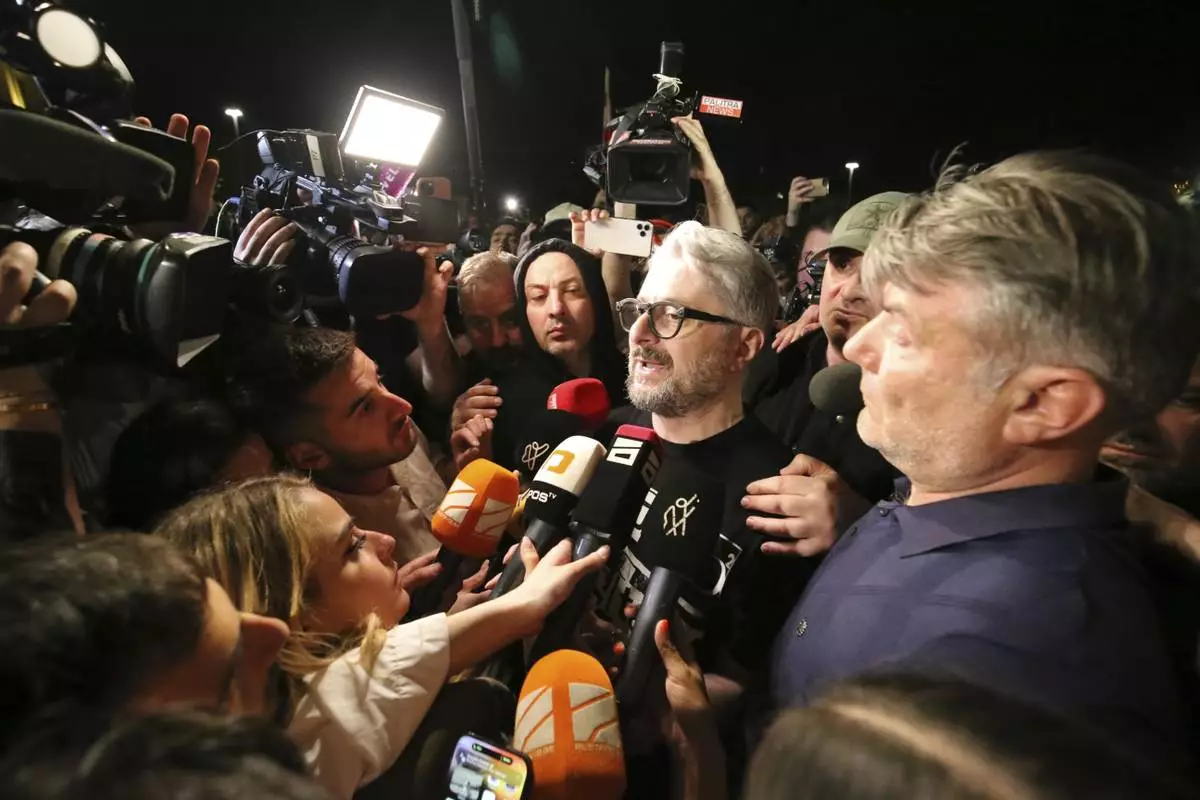
Nika Gvaramia, a Georgian politician and the founder of the Ahali party and Mtavari TV, one of the biggest TV media outlets in the country, speaks to journalists during a rally outside the parliament building in Tbilisi, Georgia, on Wednesday, April 17, 2024, to protest against "the Russian law" similar to a law that Russia uses to stigmatize independent news media and organizations seen as being at odds with the Kremlin. (AP Photo/Zurab Tsertsvadze)
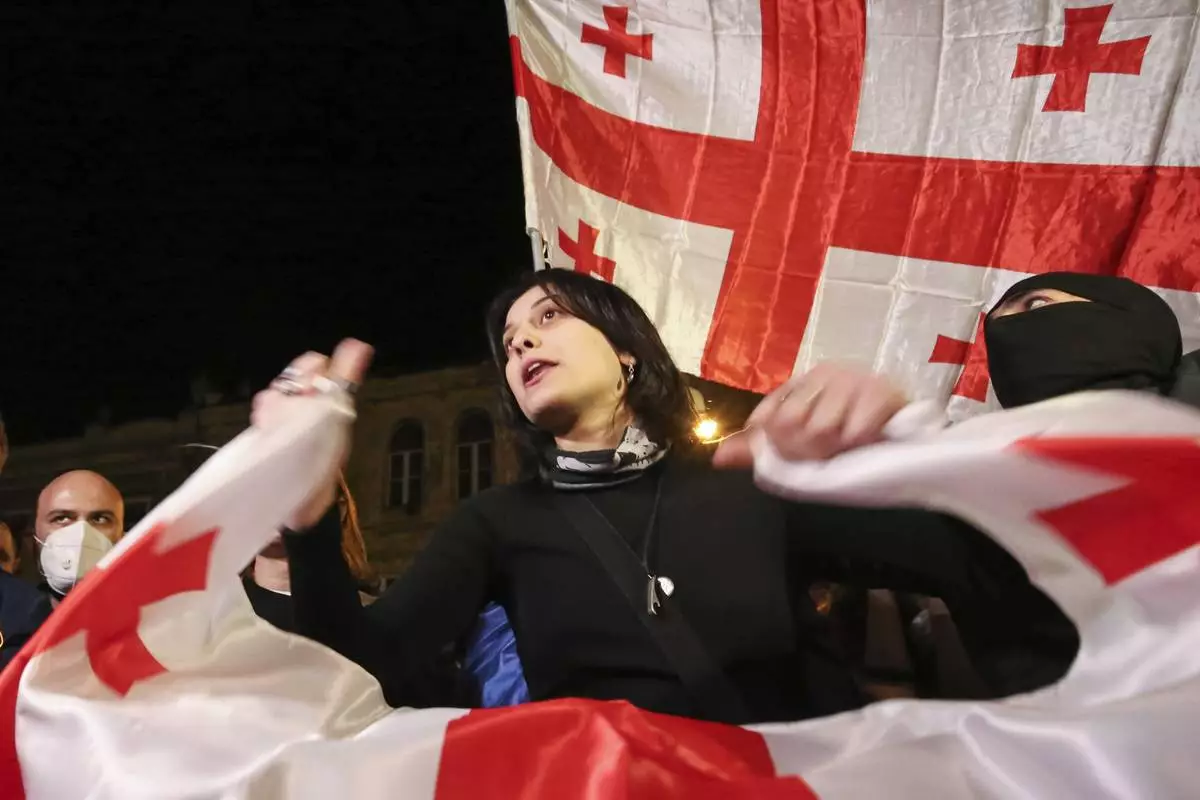
A demonstrator waves Georgian national flags during a rally outside the parliament building in Tbilisi, Georgia, on Thursday, April 18, 2024, to protest against "the Russian law" similar to a law that Russia uses to stigmatize independent news media and organizations seen as being at odds with the Kremlin. (AP Photo/Zurab Tsertsvadze)
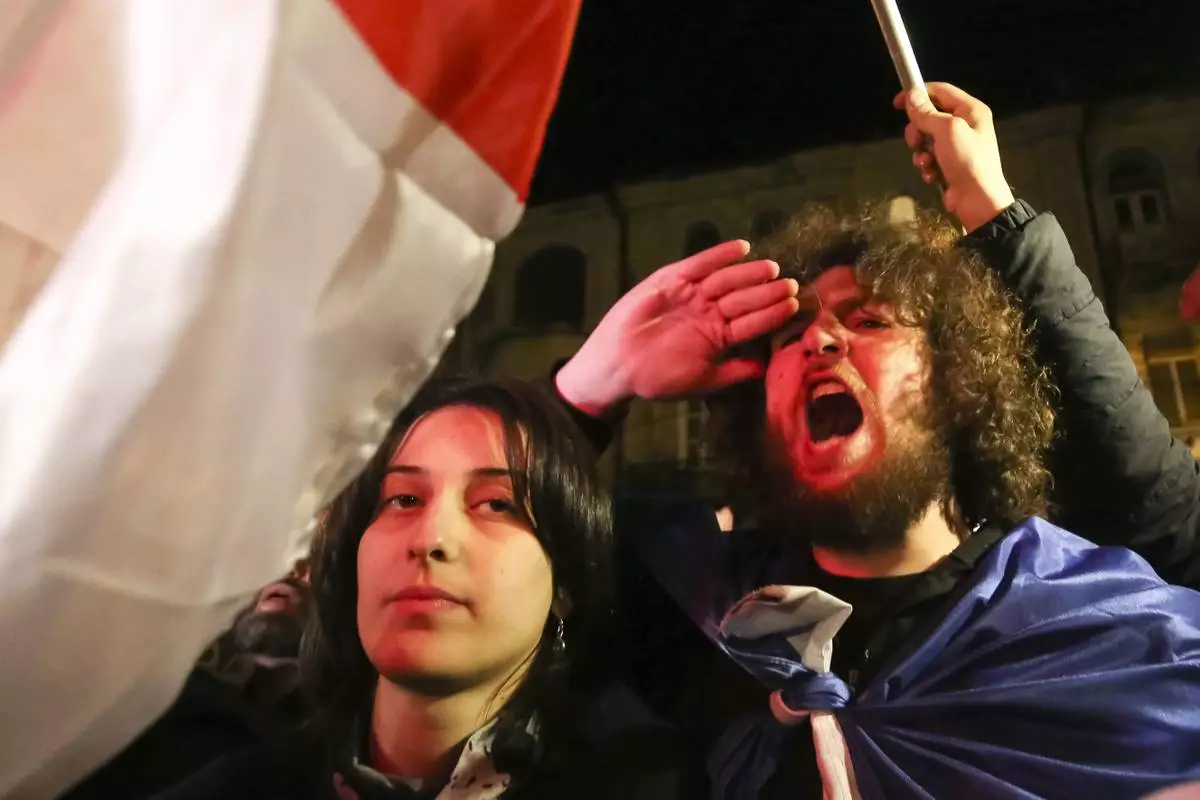
A demonstrator shouts during a rally outside the parliament building in Tbilisi, Georgia, on Thursday, April 18, 2024, to protest against "the Russian law" similar to a law that Russia uses to stigmatize independent news media and organizations seen as being at odds with the Kremlin. (AP Photo/Zurab Tsertsvadze)
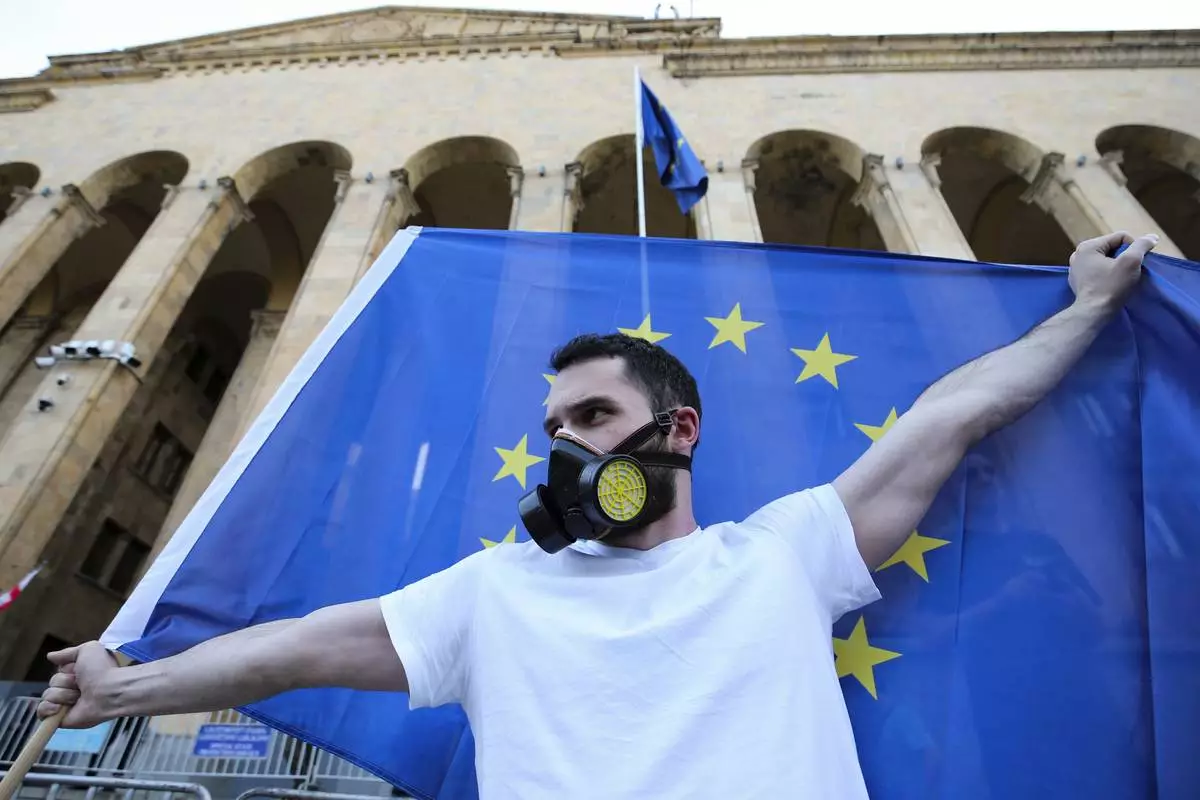
A demonstrator holds a EU flag as other gather outside the parliament building in Tbilisi, Georgia, on Wednesday, April 17, 2024, to protest against "the Russian law" similar to a law that Russia uses to stigmatize independent news media and organizations seen as being at odds with the Kremlin. (AP Photo/Zurab Tsertsvadze)
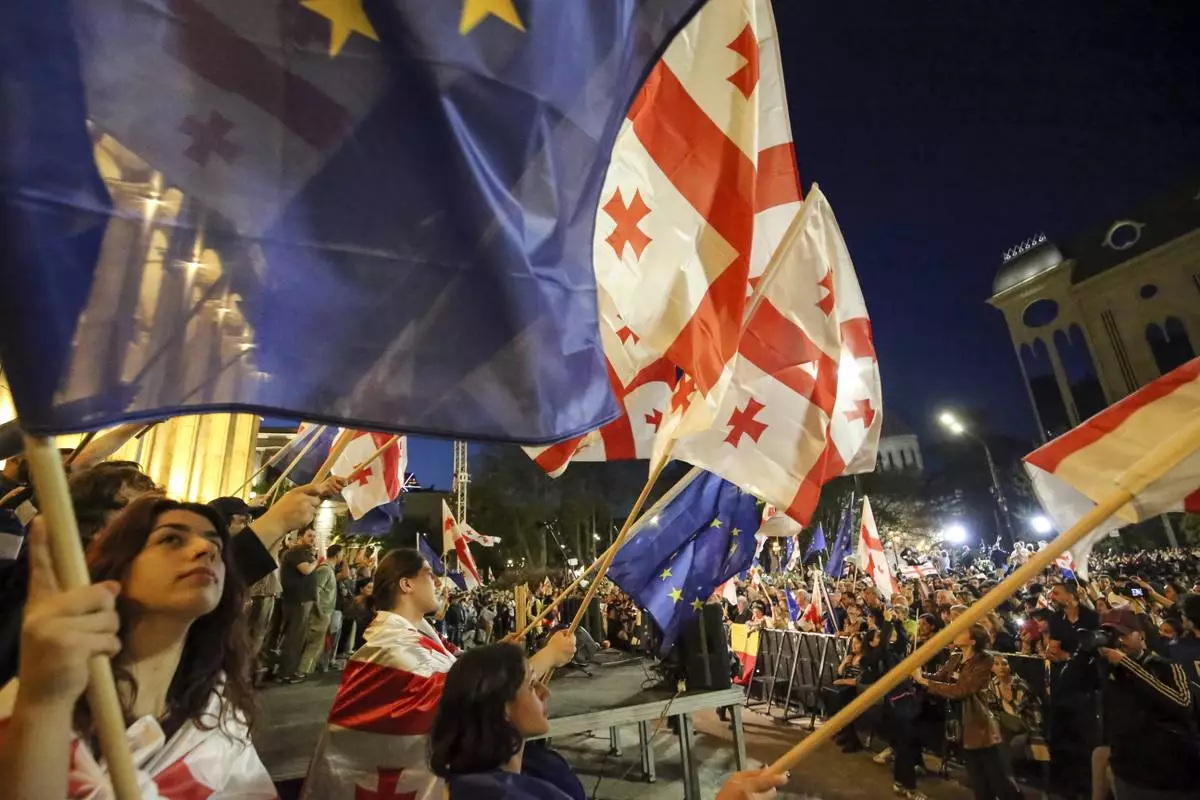
Demonstrators wave Georgian and EU flags as they gather outside the parliament building in Tbilisi, Georgia, on Wednesday, April 17, 2024, to protest against "the Russian law" similar to a law that Russia uses to stigmatize independent news media and organizations seen as being at odds with the Kremlin. (AP Photo/Zurab Tsertsvadze)
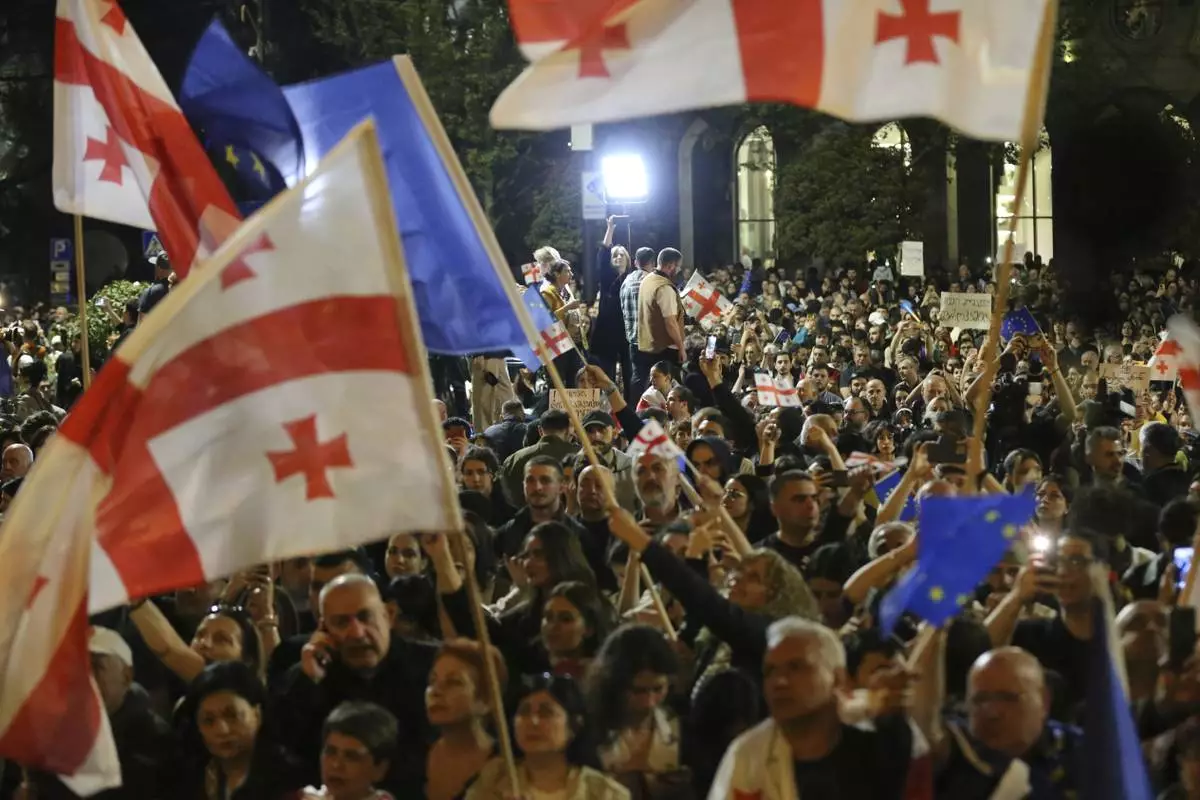
Demonstrators wave Georgian and EU flags as they gather outside the parliament building in Tbilisi, Georgia, on Wednesday, April 17, 2024, to protest against "the Russian law" similar to a law that Russia uses to stigmatize independent news media and organizations seen as being at odds with the Kremlin. (AP Photo/Zurab Tsertsvadze)
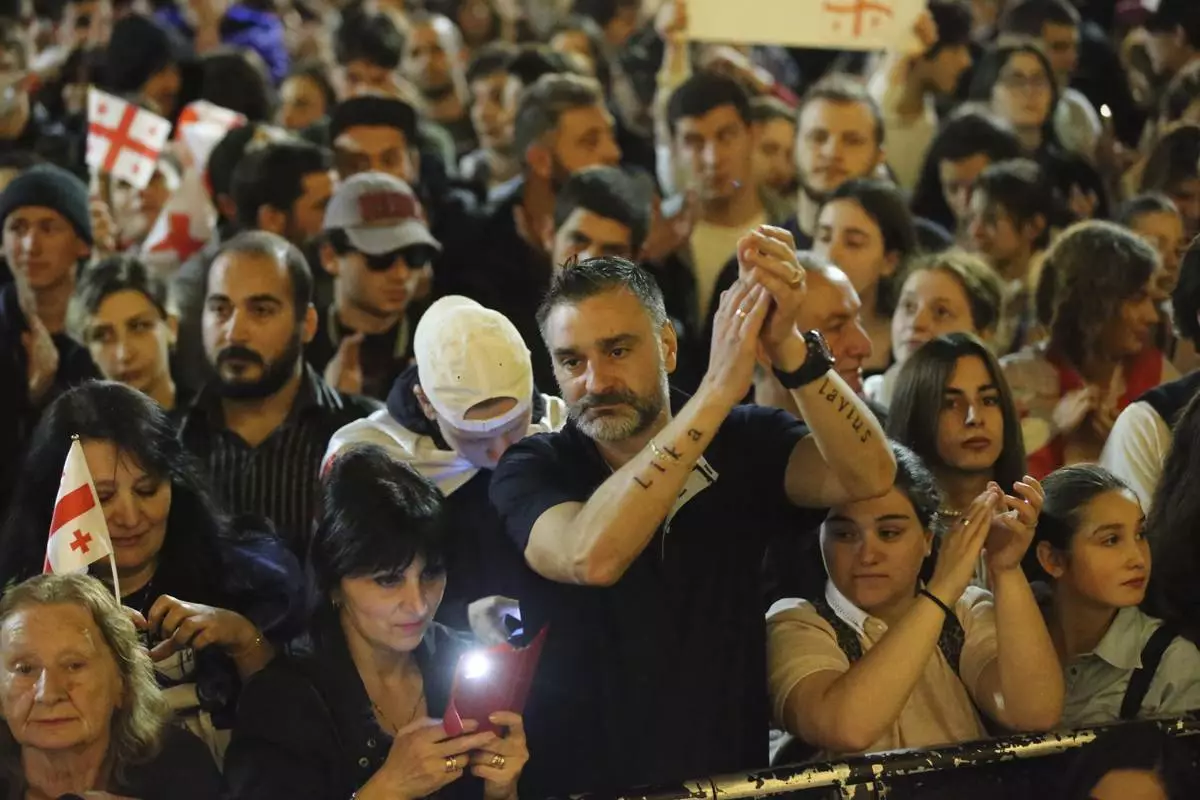
Demonstrators gather outside the parliament building in Tbilisi, Georgia, on Wednesday, April 17, 2024, to protest against "the Russian law" similar to a law that Russia uses to stigmatize independent news media and organizations seen as being at odds with the Kremlin. (AP Photo/Zurab Tsertsvadze)
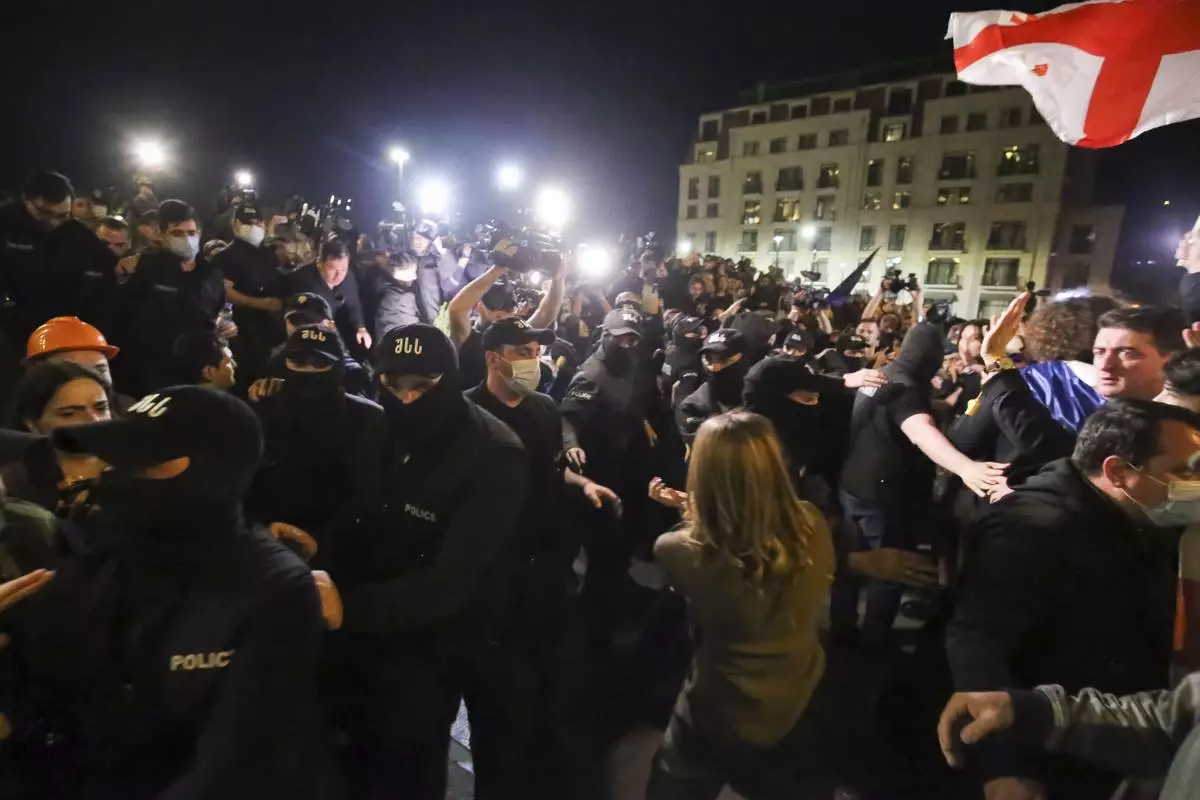
Police try to block demonstrators gathered outside the parliament building in Tbilisi, Georgia, on Thursday, April 18, 2024, to protest against "the Russian law" similar to a law that Russia uses to stigmatize independent news media and organizations seen as being at odds with the Kremlin. (AP Photo/Zurab Tsertsvadze)
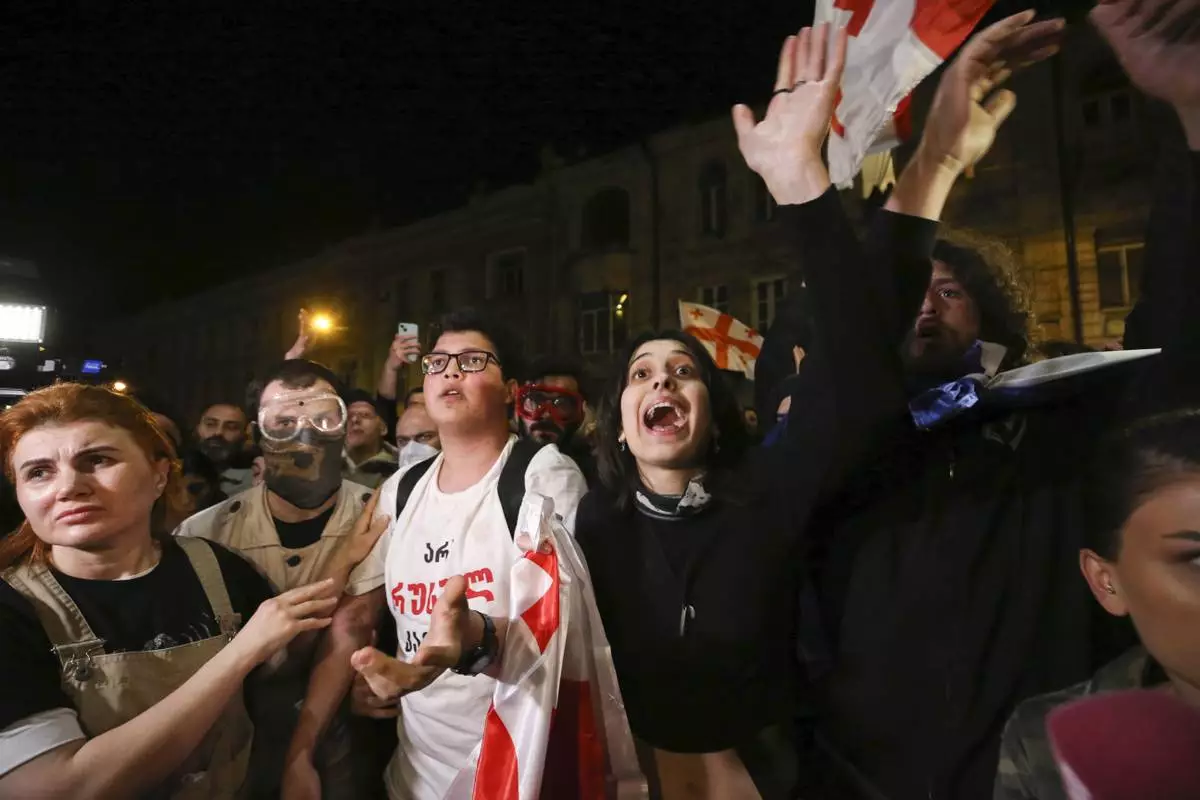
Demonstrator shouts during a rally outside the parliament building in Tbilisi, Georgia, on Thursday, April 18, 2024, to protest against "the Russian law" similar to a law that Russia uses to stigmatize independent news media and organizations seen as being at odds with the Kremlin. (AP Photo/Zurab Tsertsvadze)

A demonstrator gestures as he shouts during a rally outside the parliament building in Tbilisi, Georgia, on Thursday, April 18, 2024, to protest against "the Russian law" similar to a law that Russia uses to stigmatize independent news media and organizations seen as being at odds with the Kremlin. (AP Photo/Zurab Tsertsvadze)
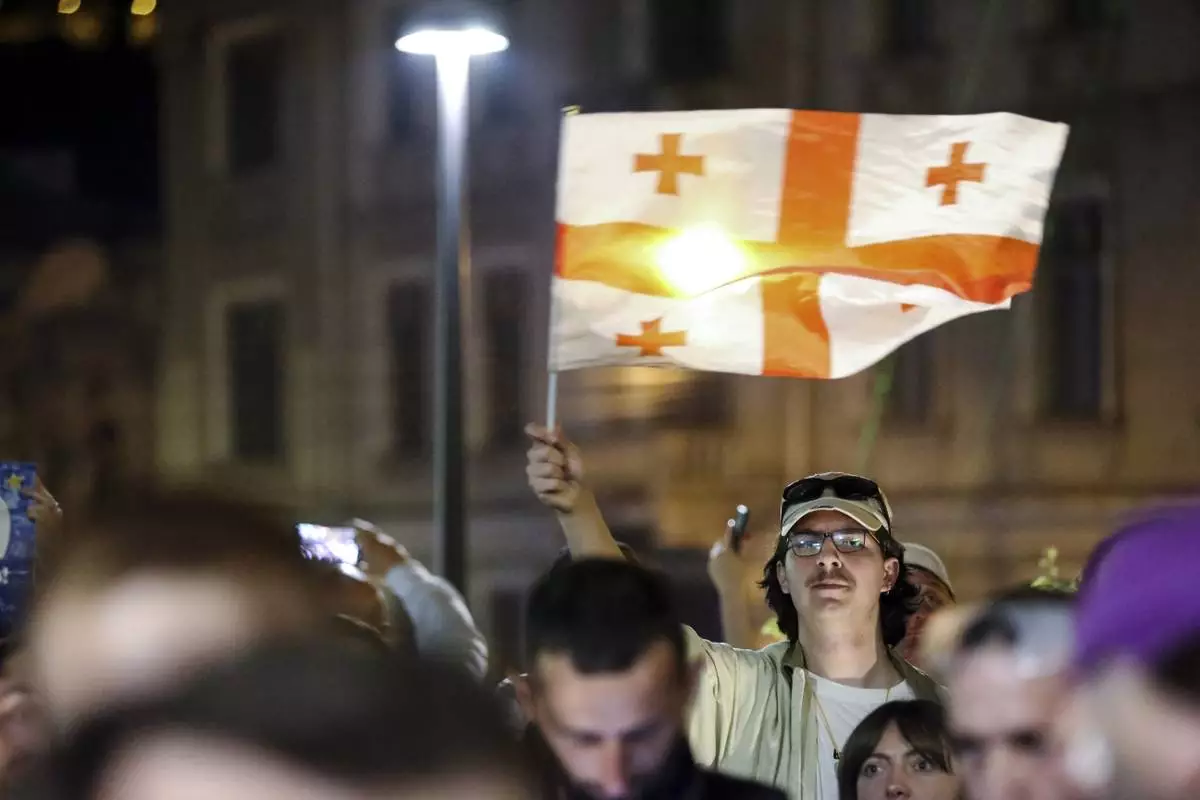
A demonstrator holds a Georgian national flag during a rally outside the parliament building in Tbilisi, Georgia, on Wednesday, April 17, 2024, to protest against "the Russian law" similar to a law that Russia uses to stigmatize independent news media and organizations seen as being at odds with the Kremlin. (AP Photo/Zurab Tsertsvadze)
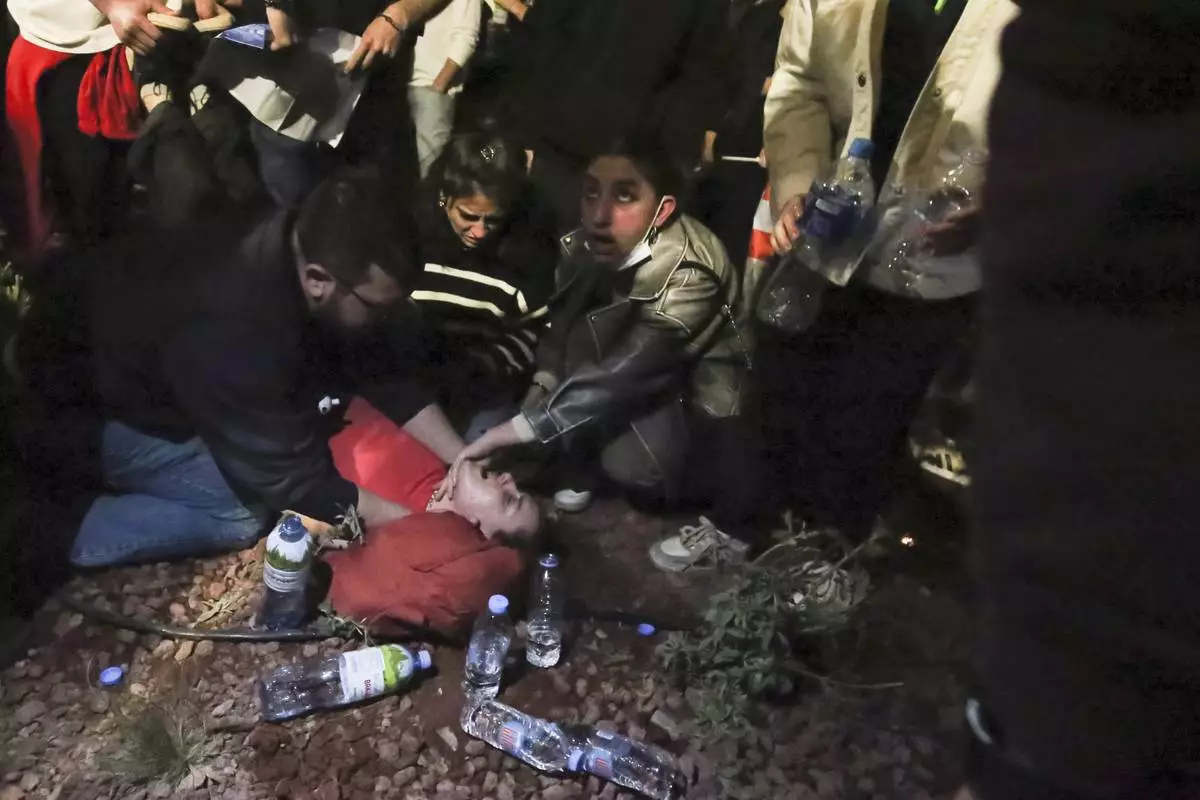
People help an unconscious demonstrator during a rally outside the parliament building in Tbilisi, Georgia, on Thursday, April 18, 2024, to protest against "the Russian law" similar to a law that Russia uses to stigmatize independent news media and organizations seen as being at odds with the Kremlin. (AP Photo/Zurab Tsertsvadze)
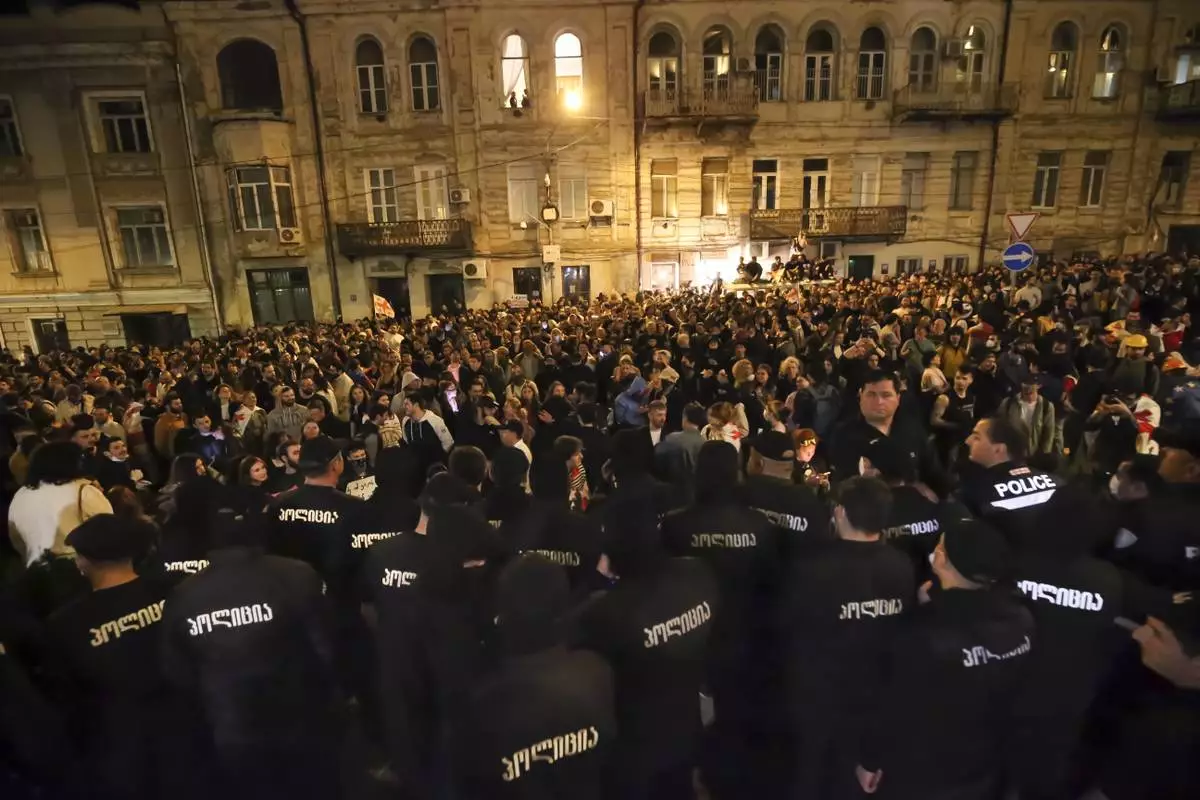
Police try to block demonstrators gathered outside the parliament building in Tbilisi, Georgia, on Wednesday, April 17, 2024, to protest against "the Russian law" similar to a law that Russia uses to stigmatize independent news media and organizations seen as being at odds with the Kremlin. (AP Photo/Zurab Tsertsvadze)
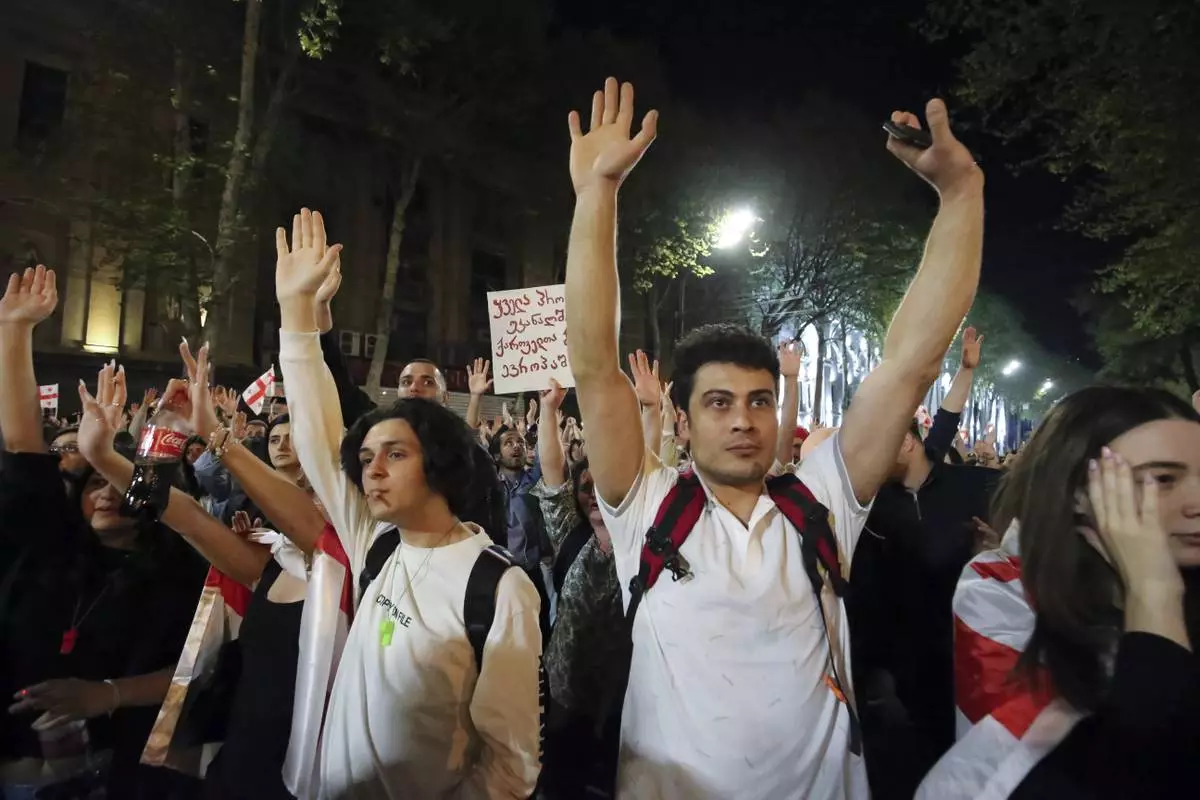
Demonstrators react listening to a speaker as they gather outside the parliament building in Tbilisi, Georgia, on Wednesday, April 17, 2024, to protest against "the Russian law" similar to a law that Russia uses to stigmatize independent news media and organizations seen as being at odds with the Kremlin. (AP Photo/Zurab Tsertsvadze)
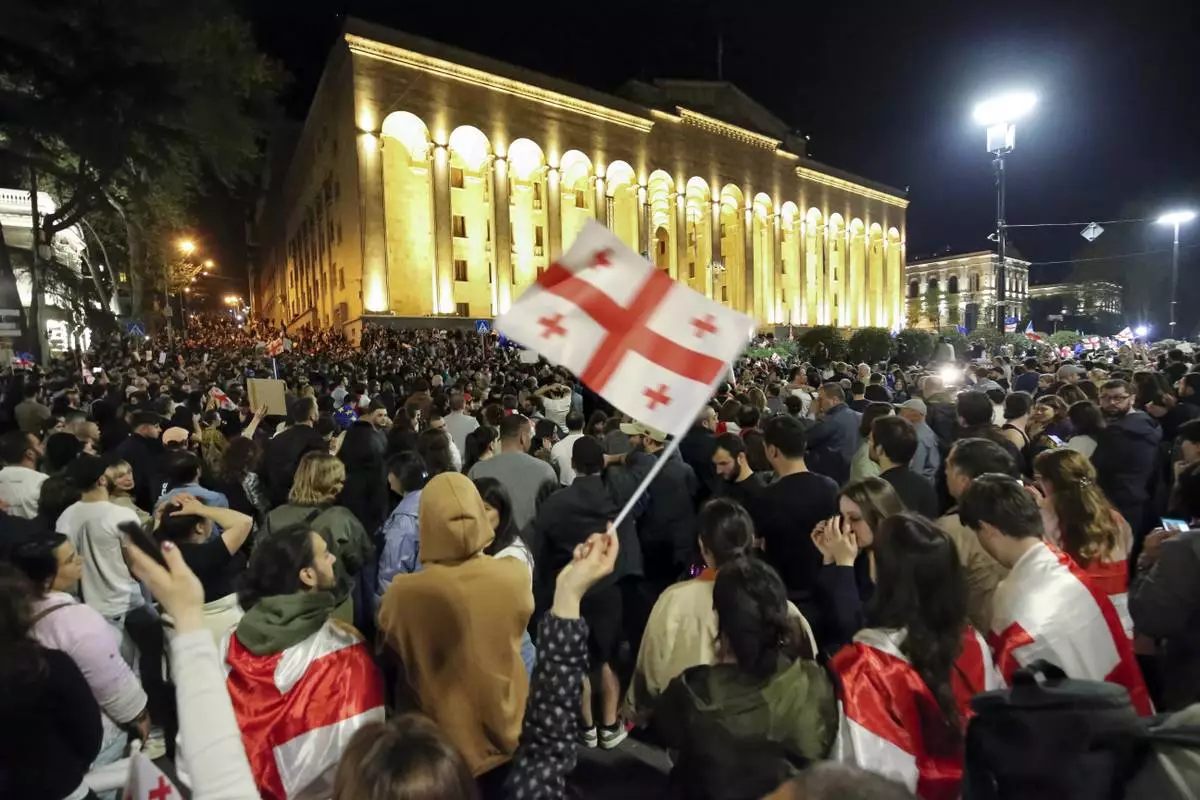
Demonstrators wave a Georgian national flag as they gather outside the parliament building in Tbilisi, Georgia, on Wednesday, April 17, 2024, to protest against "the Russian law" similar to a law that Russia uses to stigmatize independent news media and organizations seen as being at odds with the Kremlin. (AP Photo/Zurab Tsertsvadze)
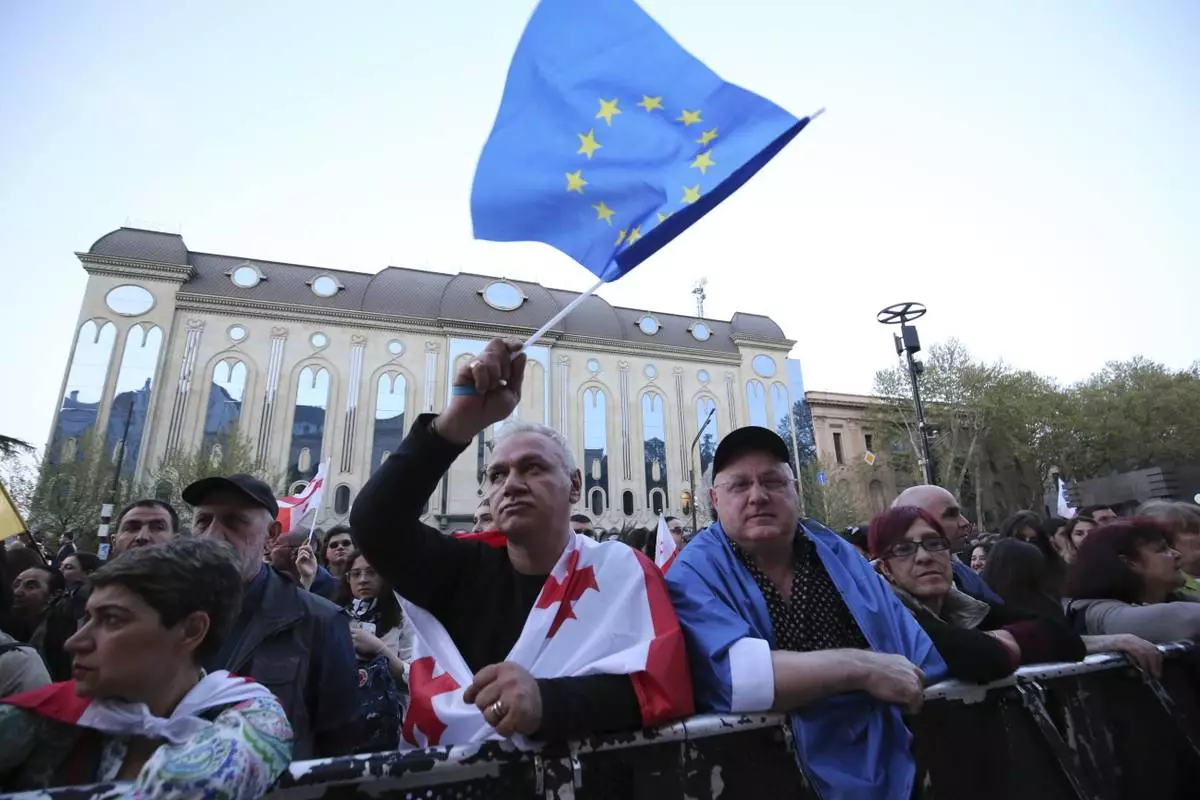
Demonstrators, one of them waves a EU flag, gather outside the parliament building in Tbilisi, Georgia, on Wednesday, April 17, 2024, to protest against "the Russian law" similar to a law that Russia uses to stigmatize independent news media and organizations seen as being at odds with the Kremlin. (AP Photo/Zurab Tsertsvadze)
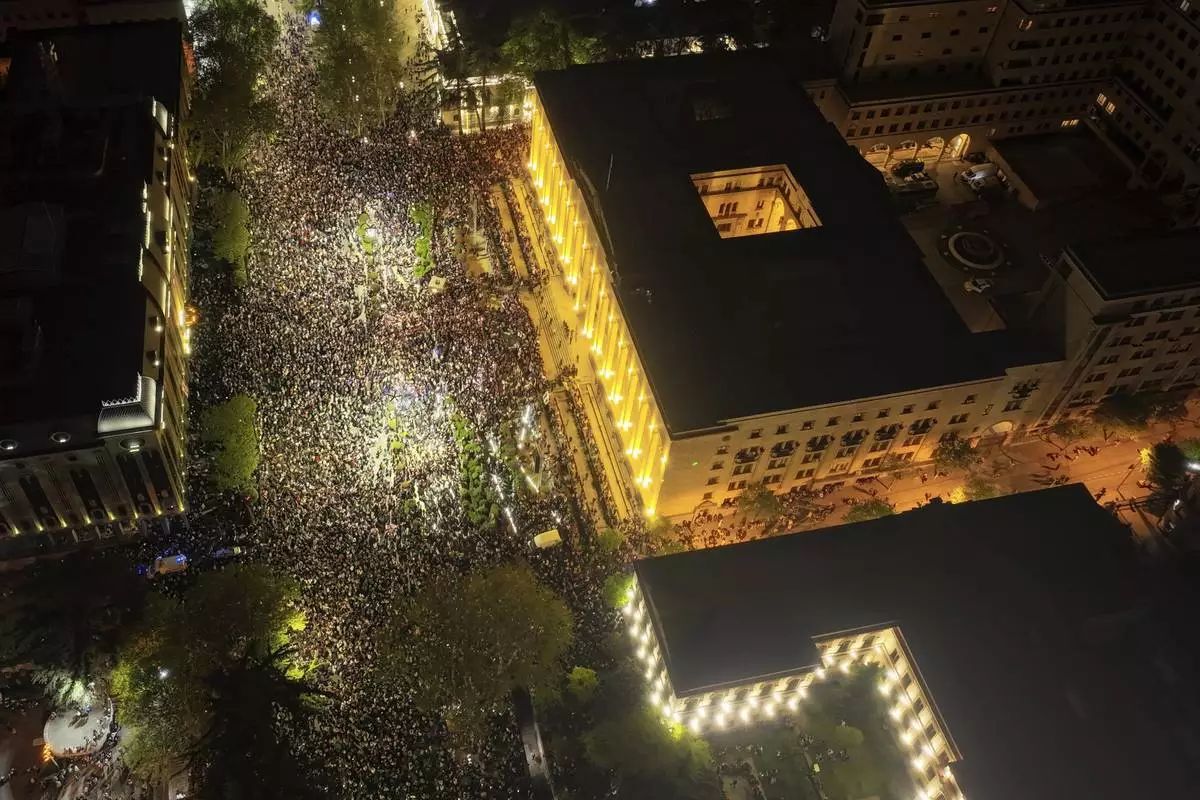
Demonstrators wave Georgian and EU flags as they gather outside the parliament building in Tbilisi, Georgia, on Wednesday, April 17, 2024, to protest against "the Russian law" similar to a law that Russia uses to stigmatize independent news media and organizations seen as being at odds with the Kremlin. (AP Photo/Zurab Tsertsvadze)
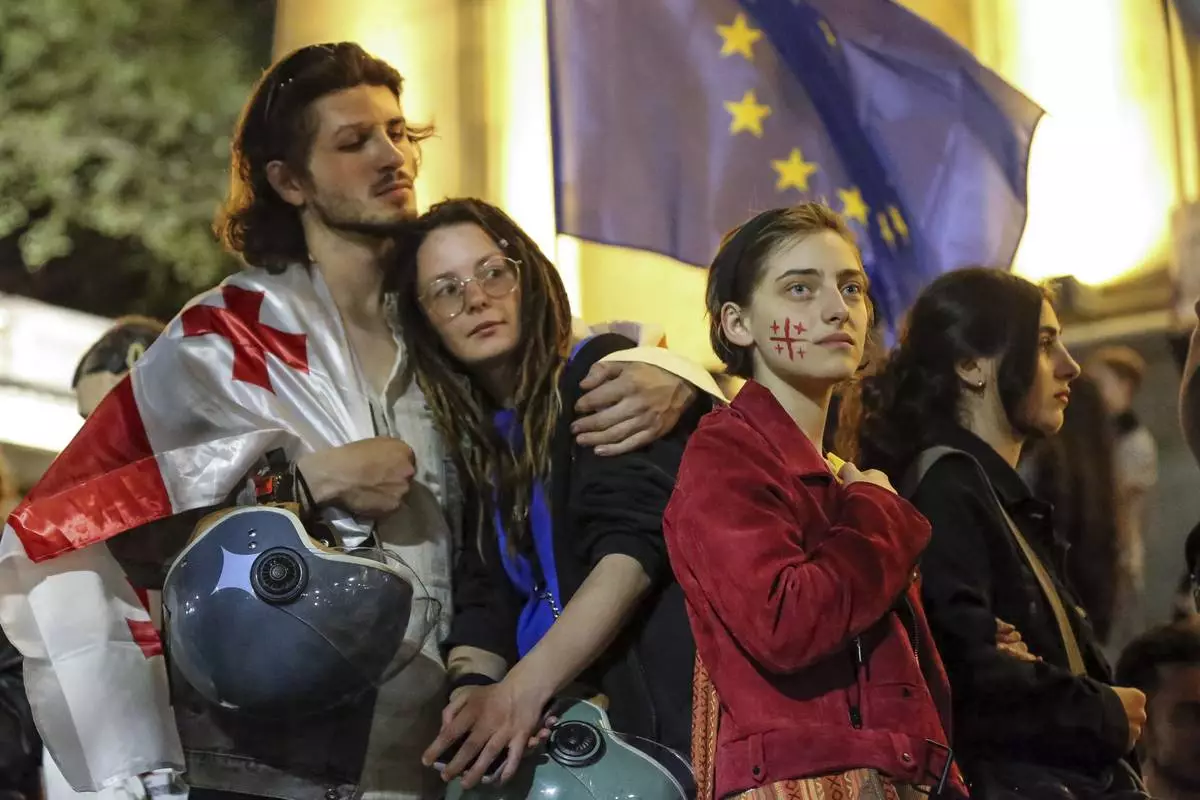
Demonstrators attend a rally outside the parliament building in Tbilisi, Georgia, on Wednesday, April 17, 2024, to protest against "the Russian law" similar to a law that Russia uses to stigmatize independent news media and organizations seen as being at odds with the Kremlin. (AP Photo/Zurab Tsertsvadze)
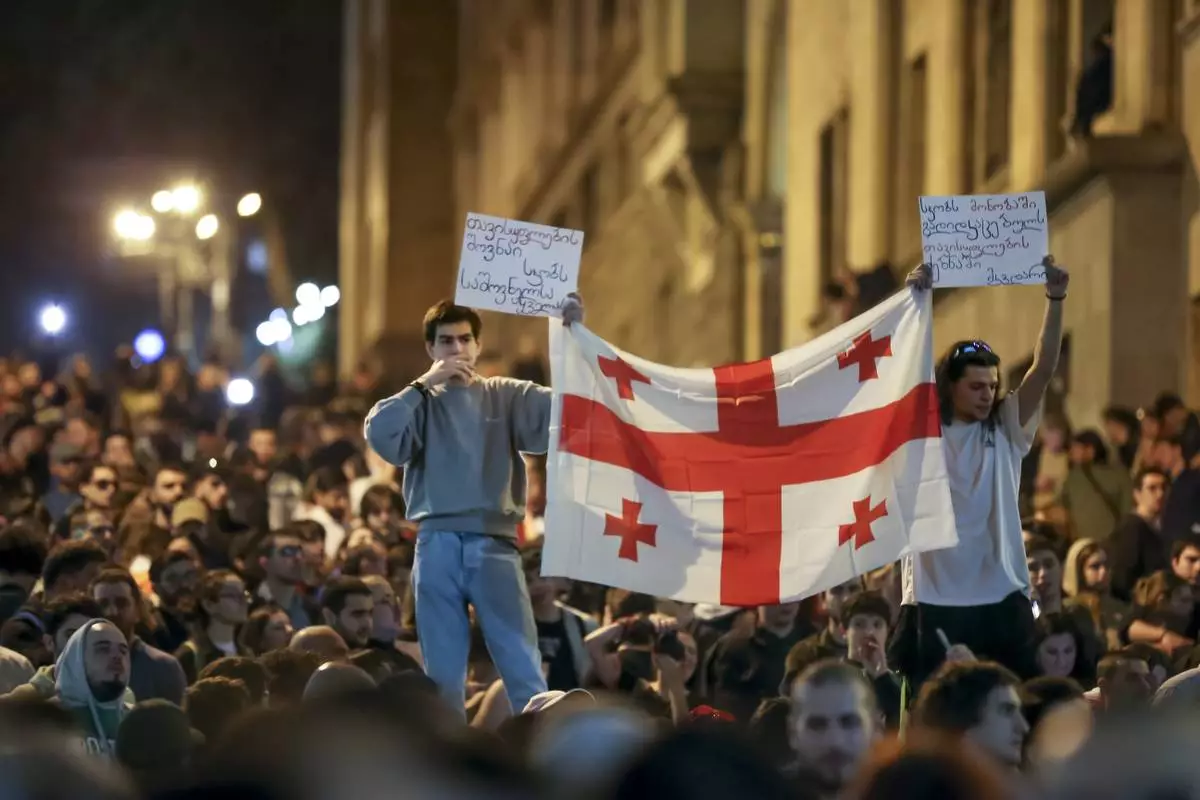
Demonstrators hold a Georgian national flag as they gather outside the parliament building in Tbilisi, Georgia, on Wednesday, April 17, 2024, to protest against "the Russian law" similar to a law that Russia uses to stigmatize independent news media and organizations seen as being at odds with the Kremlin. (AP Photo/Zurab Tsertsvadze)
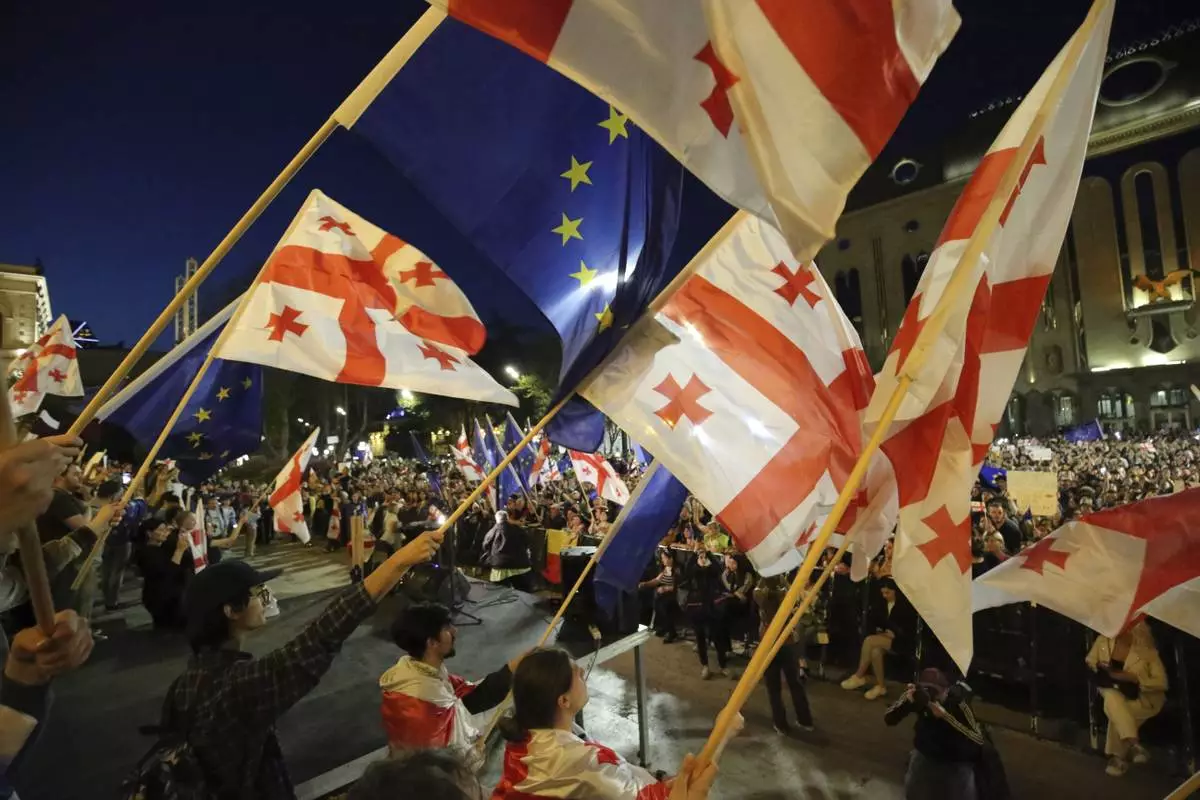
Demonstrators wave Georgian and EU flags as they gather outside the parliament building in Tbilisi, Georgia, on Wednesday, April 17, 2024, to protest against "the Russian law" similar to a law that Russia uses to stigmatize independent news media and organizations seen as being at odds with the Kremlin. (AP Photo/Zurab Tsertsvadze)
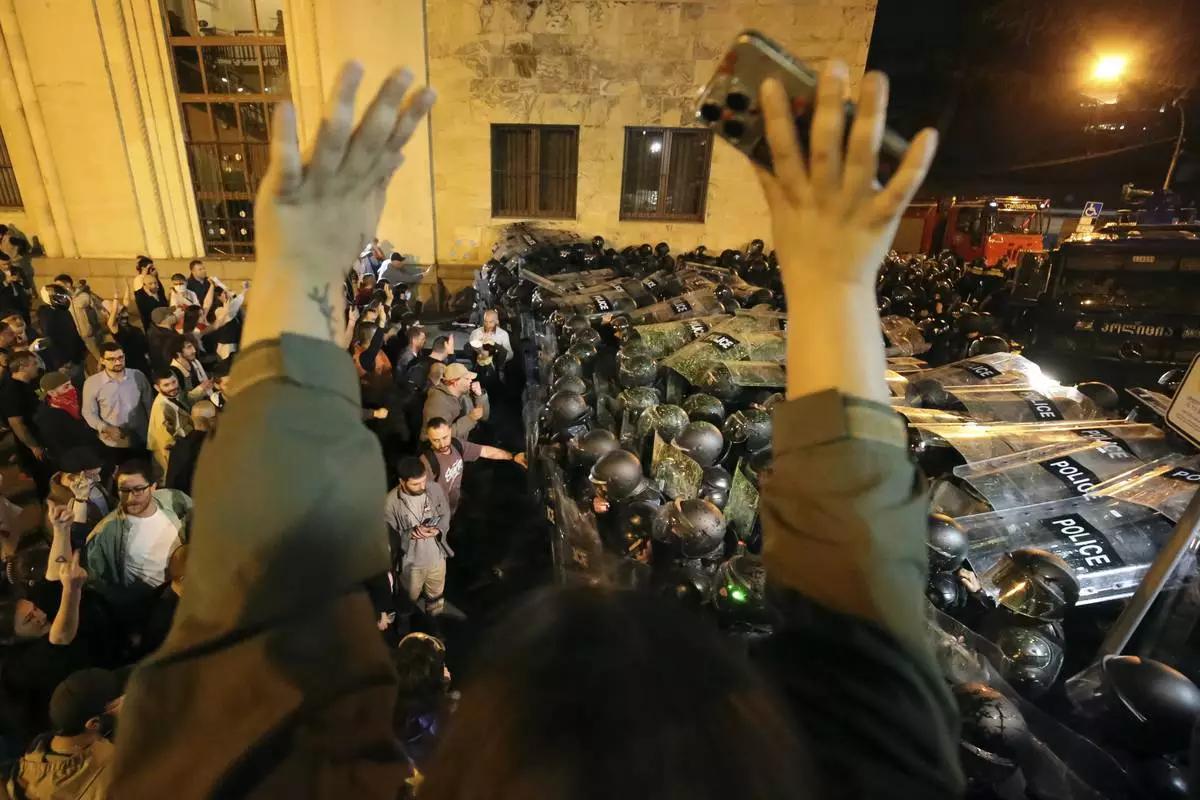
Police block protestors gathered outside the parliament building in Tbilisi, Georgia, on Tuesday, April 16, 2024, to protest against "the Russian law" similar to a law that Russia uses to stigmatize independent news media and organizations seen as being at odds with the Kremlin. (AP Photo/Zurab Tsertsvadze)
BUENOS AIRES, Argentina (AP) — When interviewed about his plans after a shock electoral victory last fall, Argentina's President-elect Javier Milei gave his go-to answer in a blink: “To exterminate inflation."
“After that ..." he trailed off, as though searching for anything else that could possibly matter. “Life,” he said, shrugging.
Driven by a single-minded obsession with slashing spending to tame inflation — now nearing 300% — the former television commentator with just two years’ experience in Congress made clear from the start he had little interest in anything but economic deregulation.
But the all-or-nothing approach has left the short-tempered libertarian economist without a single legislative achievement 142 days into his presidency, raising questions about whether he can pull off his promised free-market revolution to rescue Argentina from its worst economic crisis in two decades.
Milei, who ran against “thieving politicians,” has run into resistance from Argentina’s combustible Congress, which he calls “the rat’s nest." His bills have been rejected by political rivals, who he calls “parasites.” And he is struggling to win over disgruntled governors, who he reportedly threatened to “piss on" in a meeting last month.
But now, experts say, Milei is wising up to the game, giving up some campaign promises while maneuvering to secure enough other priorities to claim victory.
“He has had a rapid education in Machiavellian operations,” said Christopher Ecclestone, a strategist with investment bank Hallgarten & Company. “He's now using carrots and sticks to get what he wants.”
On Tuesday lawmakers — and protestors — converged on downtown Buenos Aires as the lower house continued debating a dramatically downsized version of Milei’s economic overhaul package, known as the omnibus bill.
Here's a look at the bill being discussed — and what it means for Argentina and its self-proclaimed “anarcho-capitalist" leader.
The first thing Milei did was crank out an emergency decree that allowed him to ram through hundreds of dramatic changes without Congressional oversight.
In just a few months, Milei devalued the Argentine peso by 54%, removed price controls for food and rent, froze all public works projects, halved the number of federal ministries, slashed government revenue transfers to provinces, cut fuel and transportation subsidies and laid off 15,000 state workers.
Milei claimed “a new era of prosperity” last week when Argentina logged its first quarterly fiscal surplus since 2008. He stabilized the peso's black market exchange rate after months of free-fall. Bond prices climbed.
But that's little comfort to poor and middle-class Argentines struggling to scrape by as prices rise and wages lose value. Over 40% of Argentines now live below the poverty line. Community kitchens say they're overwhelmed.
“I am forced to ask for donations because I can't afford clothes for my son,” said 37-year-old Alicia Martinez in Villa 31, an impoverished neighborhood in central Buenos Aires. “I don't know how much more I can take."
Milei may have won the run-off election with 56% vote share last November, but experts say no Argentine president has had less clout in Congress since the 1983 fall of Argentina’s military dictatorship.
“He is the weakest president in institutional terms that Argentina has ever seen,” said Ana Iparraguirre, partner at Washington-based political strategy firm GBAO.
Founded in 2021, his libertarian party, Freedom Advances, holds just 15% of seats in the lower house and 10% of the senate. None of Argentina's 23 powerful provincial governors — who hold keys to legislative support — are allies.
Milei is fighting two battles in Congress — one over his emergency decree and the other over his cornerstone omnibus bill.
Argentina's senate struck down the decree last month on the grounds it was unconstitutional. The decree remains in force until the lower house rejects it. But some judges have already suspended legislative chapters deregulating the labor market following union petitions.
The omnibus bill hasn't fared much better. The lower house approved in general terms a watered-down version of the original 664-article bill in February. But opposition lawmakers rejected key proposals, prompting Milei to withdraw the whole thing.
Moderating his tone, Milei entered weeks of negotiations with mainstream right-wing and centrist parties — and emerged with the even more scaled-back bill being debated in the lower house.
The omnibus bill remains controversial in granting Milei vast legislative powers in energy, tax, pensions, security and other areas.
But gone are the measures that could have bankrupted Argentina's powerful trade unions by eliminating automatic dues. Gone are the most extreme privatization plans that would have sold off Argentina's national bank and largest oil company.
In further concessions, Milei agreed he wouldn’t eliminate certain state agencies he has largely defunded, like Argentina’s national film institute and leading research body. To win over cash-strapped governors, Milei lowered salary thresholds subject to income tax.
“He presents himself as an uncompromising radical thinker but when push comes to shove, he is perfectly able to make compromises,” said Eugenia Mitchelstein, associate professor of politics at Argentina's University of San Andrés. “His 100-day honeymoon has come and gone ... He needs this law to pass.”
Milei's has powered his overhaul with little more than budget cuts by decree.
The International Monetary Fund expects a 2.8% economic contraction for Argentina this year. Businesses are firing. Argentines are cutting back on consumption, stoking fears of a recession.
Milei is betting foreign investment can help Argentina turn the corner. But first he needs to show investors — and the IMF, to which Argentina owes $44 billion — “that he can govern,” said Lucas Romero, who leads the consultancy Synopsis.
Economy Minister Luis Caputo seemed to recognize that during his remarks Monday at the Buenos Aires Stock Exchange addressed to businessmen.
“Our economic recovery depends on how successful we are in convincing you,” he said.
Associated Press writer Almudena Calatrava contributed to this report.
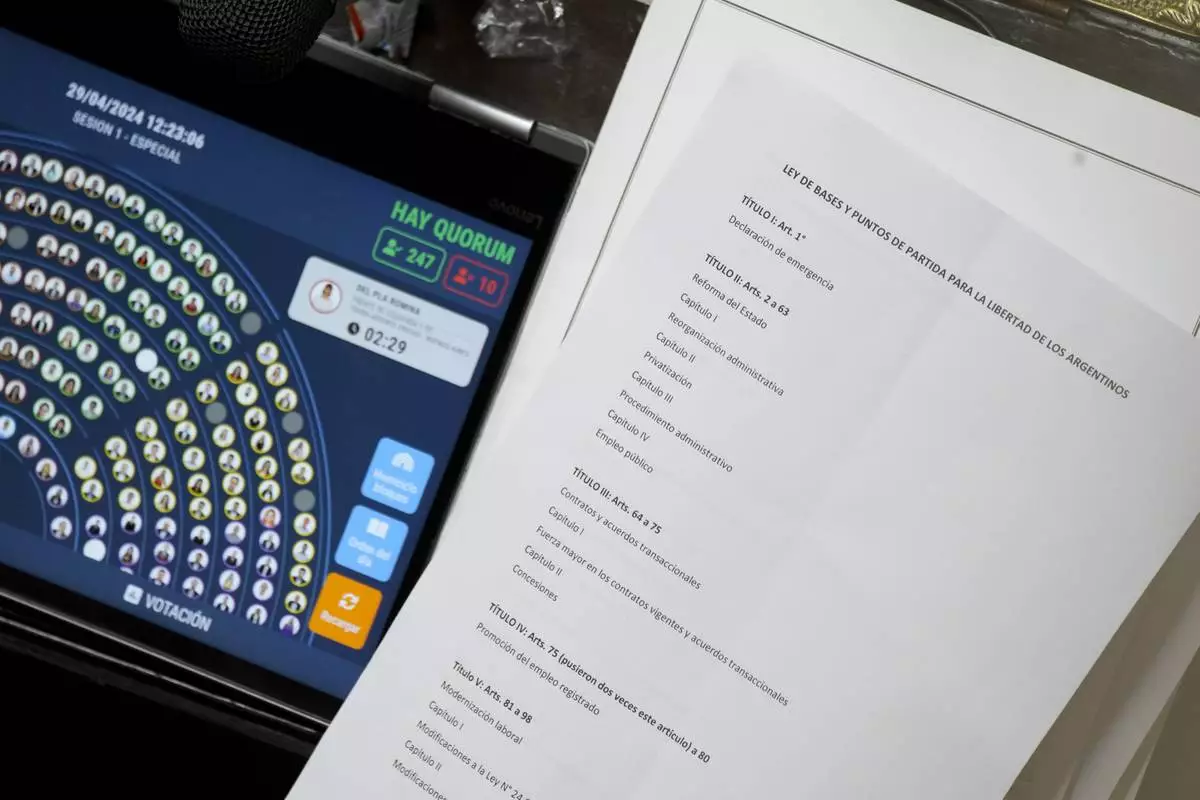
A copy of a bill, promoted by Argentine President Javier Milei that includes a broad range of economic, administrative, criminal, and environmental reforms, lays on a lawmaker's desk as Congress debates the bill in Buenos Aires, Argentina, Tuesday, April 30, 2024. (AP Photo/Natacha Pisarenko)
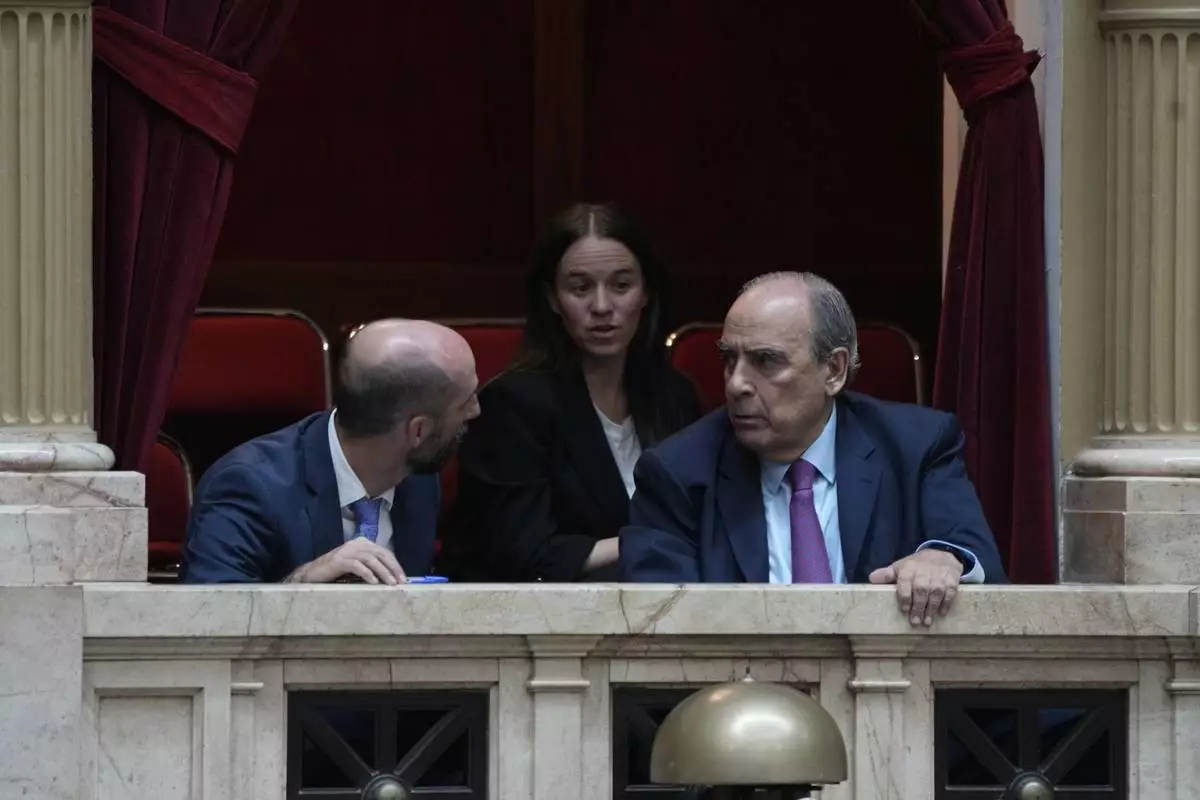
Interior Minister Guillermo Francos, right, attends lawmakers' debate on a bill promoted by Argentine President Javier Milei that includes a broad range of economic, administrative, criminal, and environmental reforms, at Congress in Buenos Aires, Argentina, Tuesday, April 30, 2024. (AP Photo/Natacha Pisarenko)
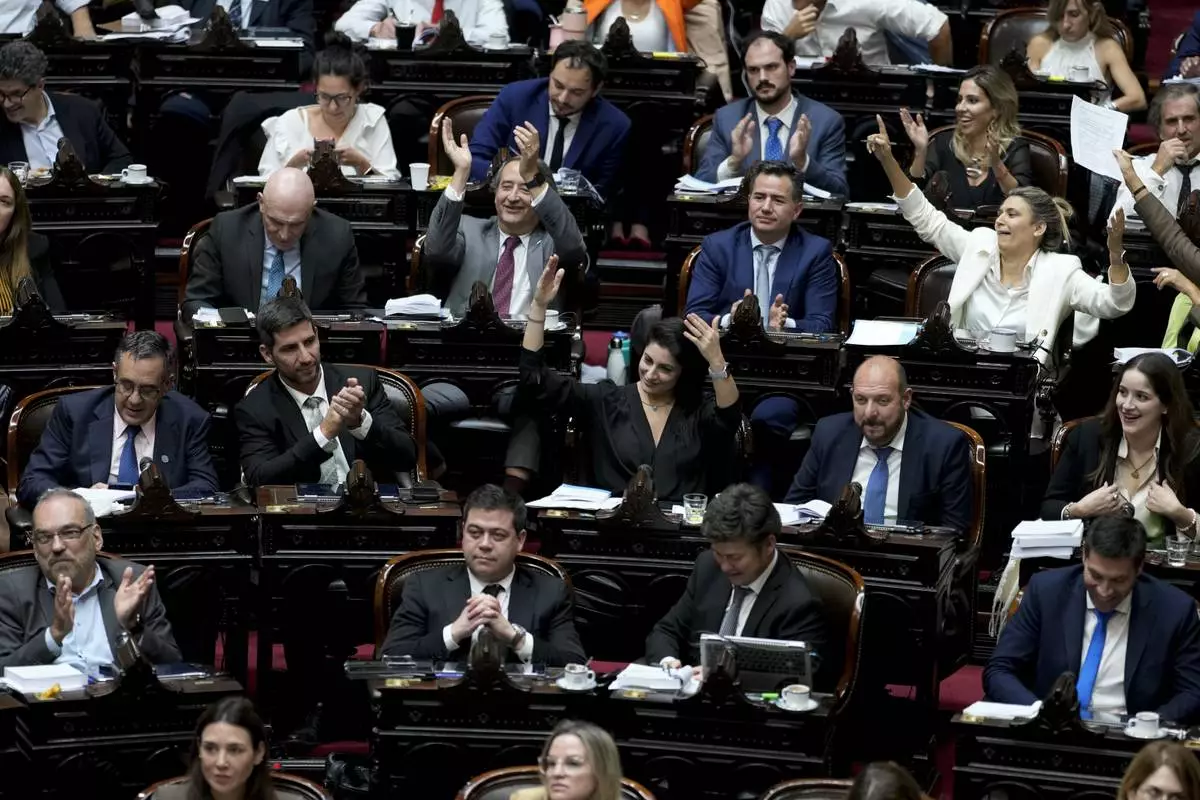
Lawmakers celebrate after approving part of a bill promoted by Argentine President Javier Milei in Buenos Aires, Argentina, Tuesday, April 30, 2024. Congress' lower house is debating a bill promoted by Argentine President Javier Milei that includes a broad range of economic, administrative, criminal, and environmental reforms. (AP Photo/Natacha Pisarenko)
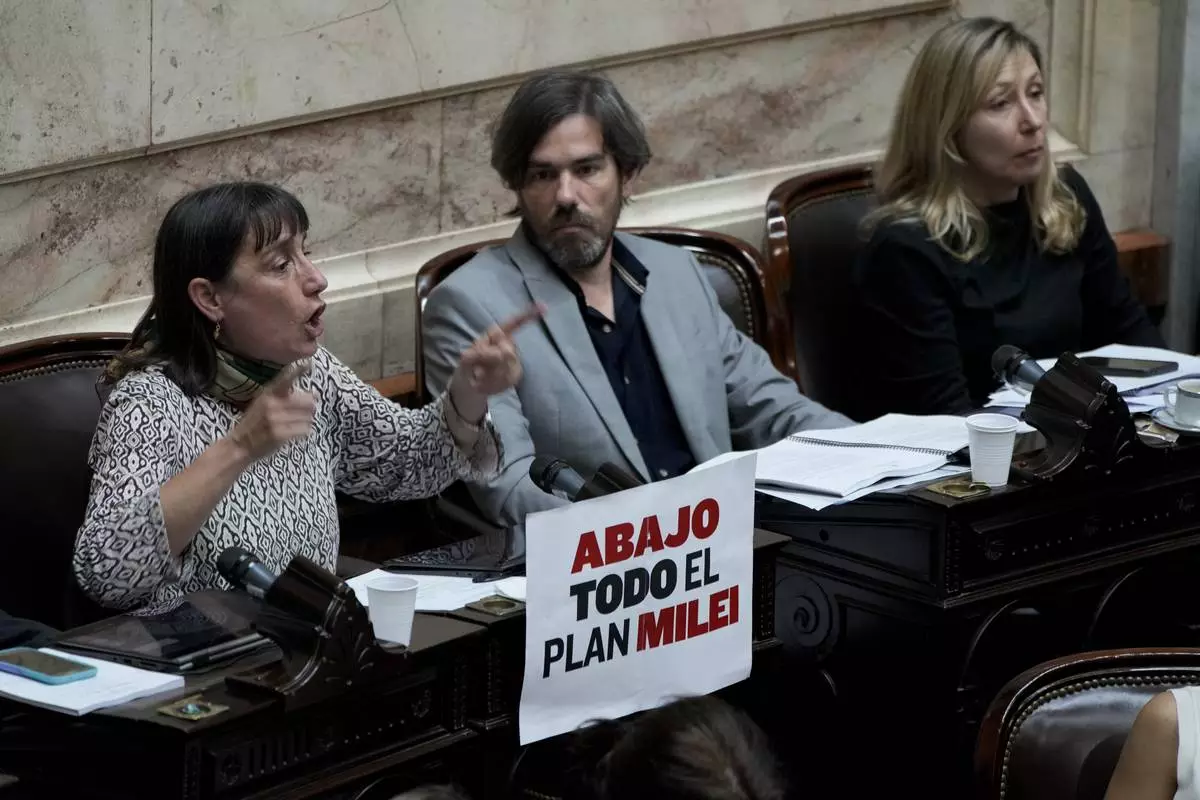
Opposition lawmaker Romina Del Plá speaks during the debate on a bill promoted by Argentine President Javier Milei that includes a broad range of economic, administrative, criminal, and environmental reforms, at Congress in Buenos Aires, Argentina, Tuesday, April 30, 2024. The sign reads in Spanish: "Down with all of Milei's plan." (AP Photo/Natacha Pisarenko)
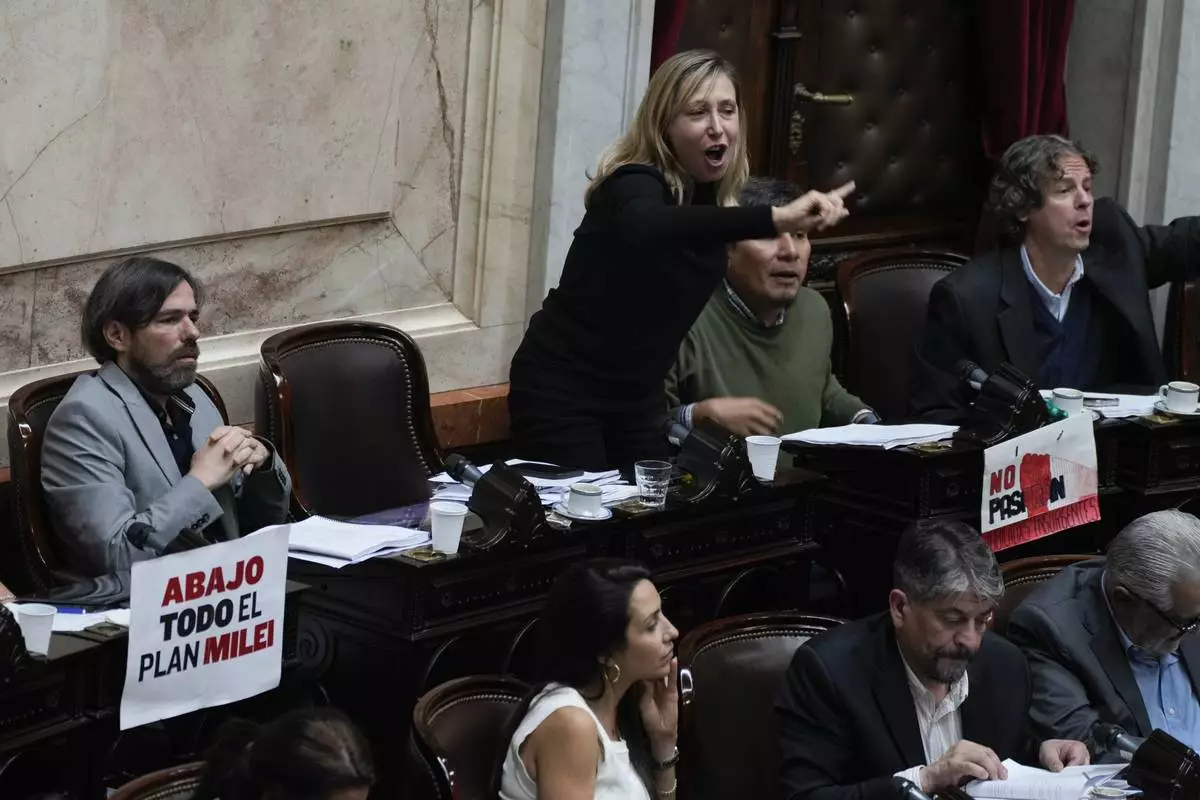
Opposition lawmaker Myriam Bregman speaks during a debate on a bill promoted by Argentine President Javier Milei at Congress in Buenos Aires, Argentina, Tuesday, April 30, 2024. The bill includes a broad range of economic, administrative, criminal, and environmental reforms. (AP Photo/Natacha Pisarenko)























